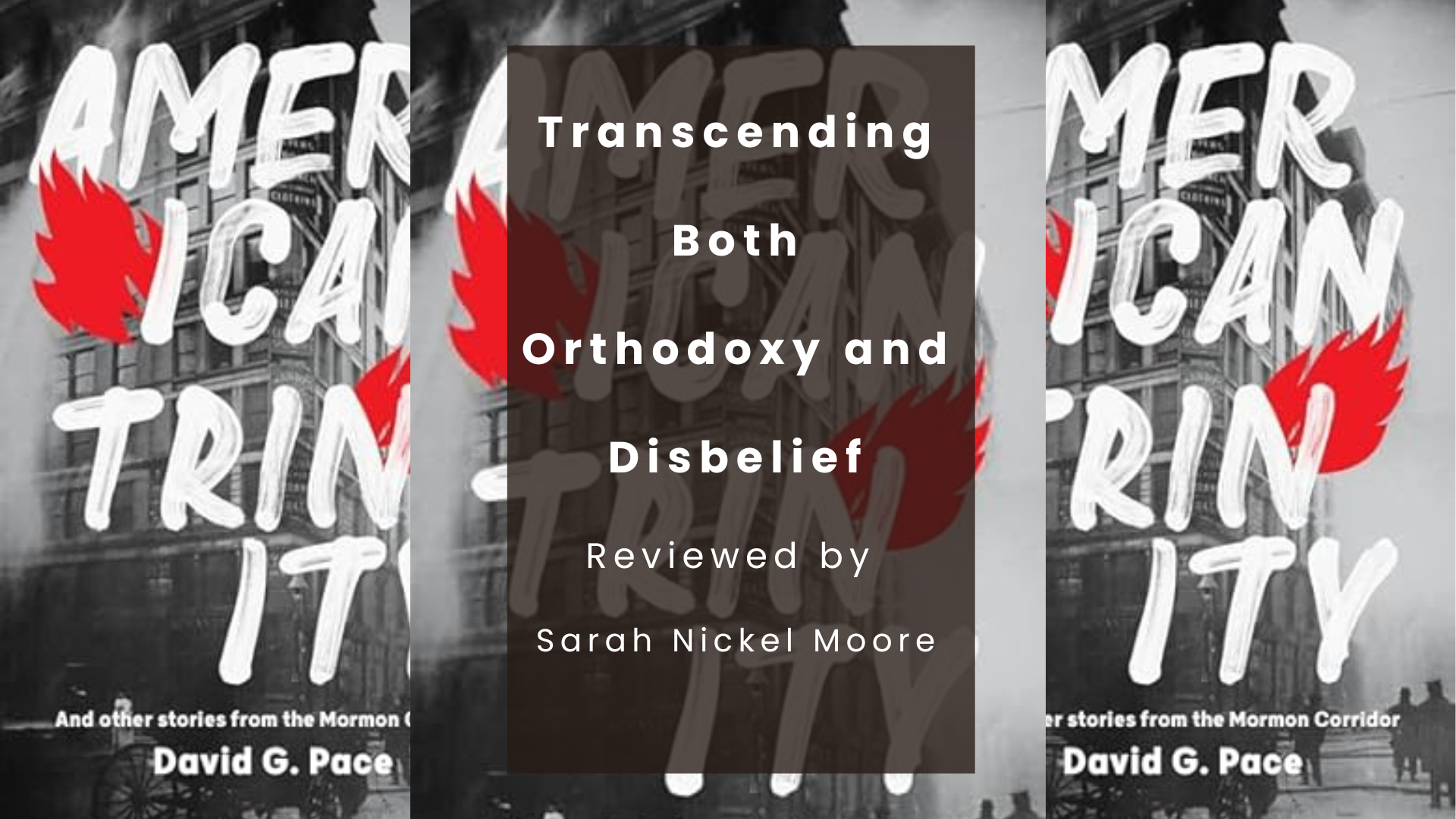Articles/Essays – Volume 58, No. 2
Transcending Both Orthodoxy and Disbelief | David G. Pace, American Trinity: And Other Stories from the Mormon Corridor
American Trinity: And Other Stories from the Mormon Corridor is a collection of short stories that grapples with the inescapable loneliness of disillusionment, while offering a glimmer of hope in a conviction that “transcends both orthodoxy and disbelief” (188). Immersed in the Mormon experience, Pace’s writings do not shy away from the grief, fear, and disorientation that so often accompany a so-called loss of faith. In prose that sometimes rivals Hemmingway for its brutality, Pace delivers characters that confront the impossibility of human existence in a world in which the first noble truth is the inevitability of suffering.
Pace frames his stories by utilizing the mythos of the “Three Nephites”—apostles of Christ who, according to the Book of Mormon, chose to remain on Earth, ministering unto its inhabitants, until the Second Coming. In so doing, they linger in the world for two thousand years in a state of undeath: eating, walking, breathing, and yet completely separate from everyone surrounding them. Of all the people who have lived and died, they alone seem to have perfected the command to be “in this world but not of it” (John 15:19). It is into this liminal space that Pace presses: The characters in Pace’s stories ask us to sit with them in the discomfort of existence in the isolation of faith—however it manifests—and the inability to move on.
The collection opens with the story of Zeb, the youngest of the Three Nephites, who has reached the point in which his ongoing ministering is no longer sustainable. He seeks for connection with the people surrounding him by craving the one human experience he cannot have: death. He finds himself at the theater, again and again, participating in the “vicarious life on stage” until its “pre-digested” suffering becomes sterile and too easily “dismissible once [he] walks out the door” (21). So he follows the only option left to him and he seeks out the Nephite god to beg release. When the sleeping god does not respond to his pleas, he finally bids Him, and his faith, goodbye, “not as I want Him to be, but as He is” (23).

What follows is a collection of stories that (re)create Zeb’s journey. We encounter Jack, drowned in a river, whose unfound body remains in that same liminal space Zeb wandered for so many years. We find Zeb again in the awkward tension between the two strangers Paul and Saul, religious doppelgängers of Mormon and Jewish faith who find themselves sharing a hotel bed. Like Paul, we consider the “second skins” we variously cover ourselves with—the garment and the kippah, the circumcised foreskin shared by Mormons and Jews alike, and finally the “thin skin of a plane” that separates us from death as we fly, the flimsy coverings we use to hide from God, others, and ourselves (41, 44–45). Pace demands that we acknowledge the cowardice of a faith that cannot offer healing through justice, for “justice requires courage” (94). Queerness and airplane travel reoccur in “Flying Bishop” as Danny’s queer self-loathing clashes with his desire to be seen as “good, truly good” (127).
Magic realism infuses the text more and more as the collection progresses. High in the Himalayas, a mangy, whining, clinging puppy becomes a metaphor for failure in Eli’s life—failure in marriage, in faith, in himself. The metaphor lies so thick in the dog’s dark fur that it is impossible to separate the creature itself from the weight of all it represents, and the eyes of the Buddha statue, watching Eli as he holds the pup, seem sentient, if indifferent, to their joint suffering. Later in “Angels in Utah” we encounter tiny Ministering Angels, mysterious angels who monitor the progress of the redemption of the dead and the living and in so doing turn Salt Lake City into a surveillance state. Finally, “Dreamcatcher” offers a talking Sphynx, a reticent but sentient statue, and an owl who snatches the “dreams of the city” (180). American Trinity ends as it begins by weaving together reality and myth to enable us to see how even the most ordinary of moments is imbued with the heavy weight of . . . something. An unanswered question, the reach of eternity, and the absurdity of life.
The unflinching honesty of these tales brings Pace—and Zeb—together in the belief that the real threat to our lives is not disbelief or secret wars but rather the loss of a record, of a book—not the loss of ourselves but of the “literary self” (22). Pace’s stories here are a type of sacrificial offering to Zeb, a gift that gives voice to those whose lives have “passed away as it were unto us a dream” (22).
David G. Pace. American Trinity: And Other Stories from the Mormon Corridor. By Common Consent Press, 2024. 188 pp. Paper: $11.95. ISBN: 978-1961471023.


 Back to full Issue
Back to full Issue

